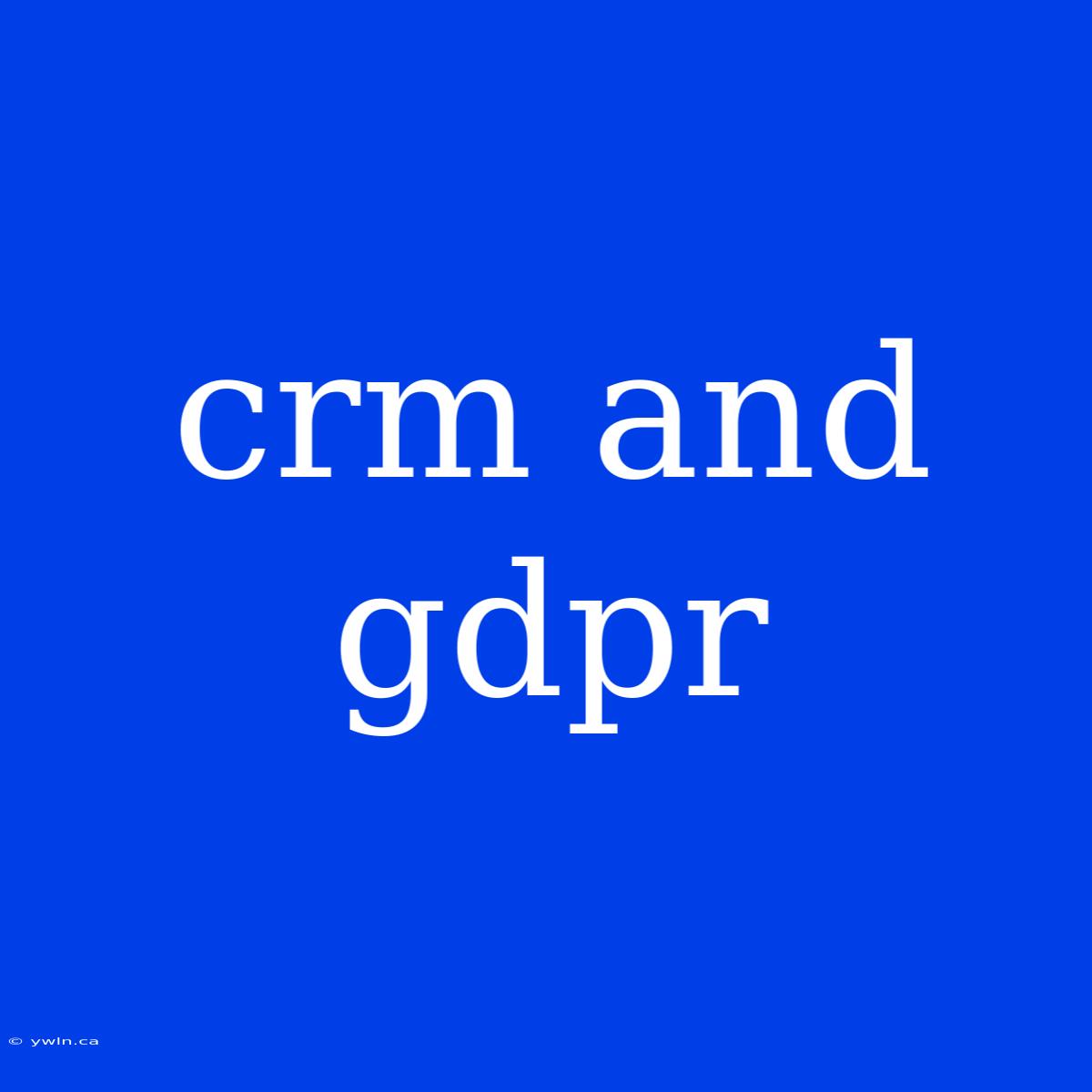CRM and GDPR: A Guide to Compliance and Customer Trust
Can CRM systems be used while respecting GDPR? Absolutely! But it's crucial to understand the nuances. GDPR (General Data Protection Regulation) dictates how businesses must handle personal data, and CRM (Customer Relationship Management) systems are often at the heart of data collection and management.
Editor Note: This article delves into the intricacies of CRM and GDPR, offering practical strategies for maintaining compliance while maximizing customer relationships. This is vital for businesses operating in the European Union (EU) or handling data of EU residents, ensuring they build trust and avoid hefty fines.
Analysis: This guide draws upon extensive research and industry best practices to provide a comprehensive overview of CRM and GDPR. It examines the specific challenges posed by data collection, processing, and storage within the CRM environment, offering solutions tailored to ensure compliance and responsible data management.
Key Considerations for CRM and GDPR
| Consideration | Description |
|---|---|
| Data Minimization | Only collect the data you need, and clearly explain the purpose. |
| Transparency | Be clear and transparent about how you collect, process, and use data. |
| Data Subject Rights | Respect individuals' rights to access, rectify, erase, restrict, and transfer their data. |
| Data Security | Implement strong technical and organizational measures to protect data. |
| Accountability | Demonstrate compliance and be prepared to prove it. |
CRM and GDPR: Essential Aspects
Data Minimization: This principle means gathering only the data necessary for your specific business purposes. Avoid unnecessary data collection, such as collecting social media handles if it's not relevant to your CRM's functions.
Transparency: Ensure clear and concise information about data collection, processing, and usage is readily available to your customers. This can include a privacy policy, consent forms, and clear communication within your CRM system.
Data Subject Rights: GDPR grants individuals several rights concerning their data. Your CRM system must facilitate:
- Right to Access: Customers must be able to request and receive a copy of their data.
- Right to Rectification: Customers should have the ability to correct inaccurate data.
- Right to Erasure (Right to be Forgotten): Customers can request the deletion of their data in specific situations.
- Right to Restriction: Customers can restrict the processing of their data in certain cases.
- Right to Data Portability: Customers can request their data in a portable format.
Data Security: Implement robust security measures to protect data stored within your CRM. This includes encryption, access controls, regular security audits, and secure data backup and recovery procedures.
Accountability: Maintain detailed records of your data processing activities. This includes documenting data collection, processing purposes, security measures, and individual rights exercised. This documentation is essential for demonstrating compliance to GDPR auditors.
Data Collection and Processing
Data Collection: When collecting personal data, ensure you have a lawful basis. This could be consent, contractual necessity, legitimate interests, legal obligation, or public interest. Clearly explain the purpose of data collection and obtain explicit consent when necessary.
Data Processing: Limit data processing activities to those aligned with your stated purposes. Regularly review your processing activities and ensure you are still adhering to your stated purposes. Data must be processed fairly, lawfully, and transparently.
Data Subject Requests
Your CRM system should facilitate the handling of data subject requests efficiently. This includes:
- Access Requests: Allow users to easily access their data and export it in a readable format.
- Rectification Requests: Enable users to edit their personal information directly within the CRM.
- Erasure Requests: Develop a secure process for deleting data permanently from your CRM.
- Restriction Requests: Implement a mechanism to restrict data processing for specific individuals.
- Data Portability Requests: Provide users with the ability to export their data in a machine-readable format.
Data Security and Privacy
Data Security: Protect data through robust security measures, including encryption, firewalls, intrusion detection systems, access controls, and secure data storage.
Privacy by Design: Integrate privacy considerations into your CRM system design and development. This includes data minimization, anonymization, and secure data transfer protocols.
FAQs about CRM and GDPR
Q: What if my CRM doesn't offer GDPR-compliant features? A: Consider migrating to a GDPR-compliant CRM or implement appropriate technical and organizational measures to achieve compliance.
Q: What are the consequences of non-compliance? A: Penalties can range from warnings and fines to suspension of data processing activities.
Q: Can I use a CRM for marketing purposes without explicit consent? **A: ** Generally, no. You need a valid legal basis for marketing activities, such as legitimate interest, consent, or contractual necessity.
Q: How do I demonstrate accountability for data processing? A: Keep meticulous records of your data processing activities, including purposes, lawful bases, recipients, and security measures.
Q: Is it enough to just update my privacy policy? A: While updating your privacy policy is essential, it's not enough. You need to implement GDPR-compliant practices throughout your data management processes, including your CRM system.
Tips for Implementing GDPR Compliance in your CRM
- Conduct a comprehensive data audit to identify and assess the personal data you hold.
- Develop clear and concise data processing policies and procedures.
- Train employees on data protection and GDPR regulations.
- Implement technical and organizational measures to protect data.
- Regularly review your compliance practices and adapt to changing regulations.
Summary: CRM and GDPR - Building Trust and Compliance
This article explored the crucial intersection of CRM and GDPR, highlighting the importance of data minimization, transparency, data subject rights, data security, and accountability. Businesses must prioritize compliance to maintain customer trust, avoid penalties, and operate ethically in the digital landscape. By embracing GDPR principles within their CRM systems, organizations can foster positive customer relationships while ensuring responsible data management.

